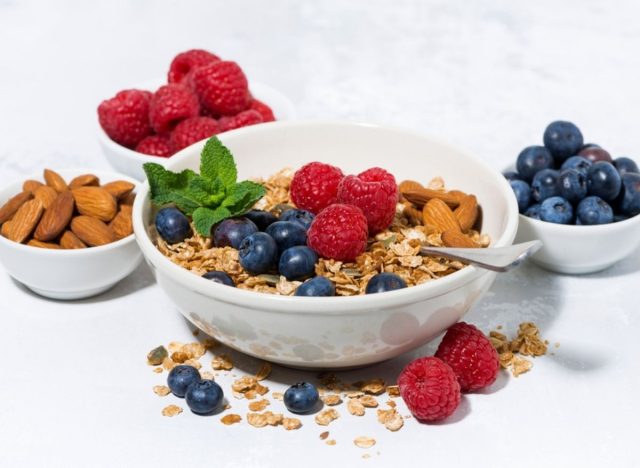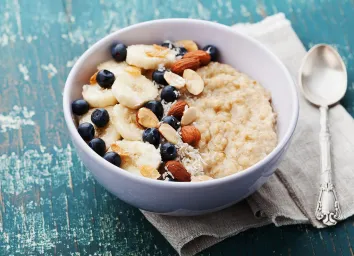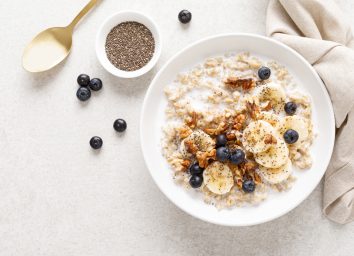The #1 Best Oatmeal Combination for High Cholesterol, Says Dietitian

Living a balanced life can sometimes require a helping hand. Juggling work, family, friends, hobbies, and wellness is no easy feat. Wouldn’t it be nice to have a nutritious breakfast recipe in your back pocket to start the day with a heart-healthy kick? Look no further than oatmeal – a fiber-packed powerhouse with tons of health benefits, including managing one’s cholesterol.
If you’ve been told you need to lower your cholesterol, you might be wondering what the big deal is. High cholesterol refers to a build-up of low-density lipoprotein (LDL), or the “bad” form of cholesterol, which creates fatty deposits along the walls of your blood vessels. The consequences can become serious, from inhibiting blood flow over time to increasing the risk of a heart attack or stroke due to clotting.
According to the Mayo Clinic, some medical conditions can contribute to having high cholesterol, such as hypothyroidism, lupus, chronic kidney disease, and diabetes. However, preventable factors like a lack of exercise, poor nutrition with high amounts of fat, smoking, and drinking all play a large role in increasing LDL cholesterol.
Whatever the reason behind your high cholesterol, eating oatmeal with a few key ingredients can simplify your journey to lower LDL, while also raising levels of high-density lipoprotein (HDL) to help your body to remove excess cholesterol.
The #1 best oatmeal recipe for managing high cholesterol is cooked oats with cinnamon, and topped with walnuts and blueberries, according to Lauren Manaker, MS, RDN, a registered dietitian nutritionist on our medical expert board and author of The First Time Mom’s Pregnancy Cookbook and Fueling Male Fertility.
The best oatmeal combination for high cholesterol is cinnamon + walnuts + blueberries.

This winning combination can be made with any cut of oatmeal because the grain itself contains beta-glucan fibers, which help manage healthy cholesterol levels by binding to LDL cholesterol and removing it before it’s absorbed by the body, according to Manaker. “While many people believe that steel cut is the only way to go, the truth is that all oats contain this important fiber.”
Cinnamon
If oatmeal is the hero of lowering cholesterol, cinnamon is the delicious sidekick. Sprinkling your oats with this spice could help with decreasing LDL. According to a 13-study review in 2017, researchers found some positive effects with cinnamon and lowered lipid levels, though some of the studies showed conflicting results. “While much more data is needed, some very preliminary data suggests that cinnamon may help manage cholesterol as well,” says Manaker.
Walnuts
As for toppings? A handful of walnuts and a cup of blueberries fortify the dish with fiber, sweetness, and a few extra benefits for your heart. “Data suggests that people who eat about half a cup of walnuts daily for two years modestly lower their LDL cholesterol levels by around 4.3 mg/dL,” Manaker explains.
Blueberries
“And the blueberries can help keep the HDL (“good”) cholesterol at a healthy level.” Studies found that the high antioxidant content in berries could be the mechanism behind its favorable effects on the cardiovascular system.
If you aren’t the biggest fan of blueberries or want to add more color to your bowl, Manaker suggests substituting in strawberries, another heart-healthy topping. She also advises keeping an eye on portion control, especially if you’re using dried berries instead of fresh, to avoid racking up the calories.
Skip these toppings…
As critical as it is to know which ingredients to include in your bowl of oatmeal, it’s just as important to know what to leave out. Common offenders? Avoid added fats and sugar to stay the course. “Cooking your oats in a low-fat milk or water instead of cream can help keep the saturated fat level in this dish low, which can help support heart health,” Manaker says.
“Leaning on the natural sweetness of the fresh berries instead of adding sugar, agave, or other added sugars can be a positive addition as well.”









